#chainsawman analysis
Explore tagged Tumblr posts
Text
i dont know shit about the whip hybrid (yet) but i think she and miri would vape in the bathroom together
#they are dating but the only 'dates' they go on are bathroom vape sessions#chainsawman analysis#csm#miri sugo#whip hybrid#whipsword
16 notes
·
View notes
Text

Nah, he did not need to say "it doesn't sit right with me" in this context like ok jokester💀
#miri sugo#csm 139#chainsaw man 139#okay but was this the translation team having creative liberty or...#it's time for someone to make a 2000 word symbolic analysis for this silly little running gag#sugo miri#csm spoilers#chainsawman spoilers
233 notes
·
View notes
Text
At least...she can be reasoned with...
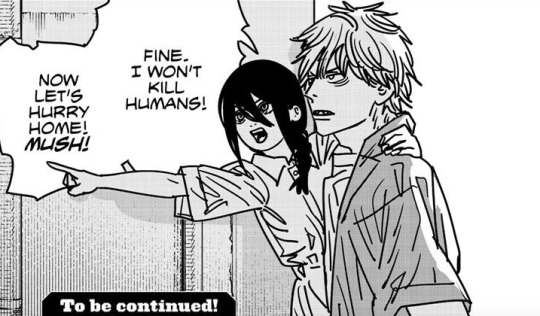
But Nayuta's cold attitude toward humanity must have been devastating for denj to hear..
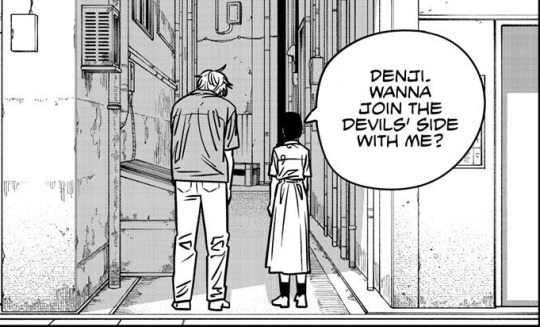

He really tried the best he knew how...but Denji never had the guidance he needed growing up...so he used the only tools he had..

And now it's pretty clear to him that he didn't do the best job as a parental figure. However he's not entirely failing either since she seems receptive to his feelings & his feelings alone...

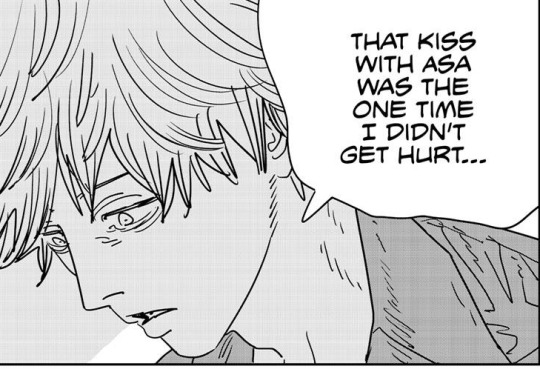
Even if it seems like every conversation is a bargain...
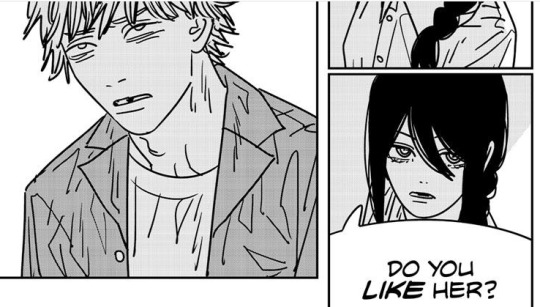
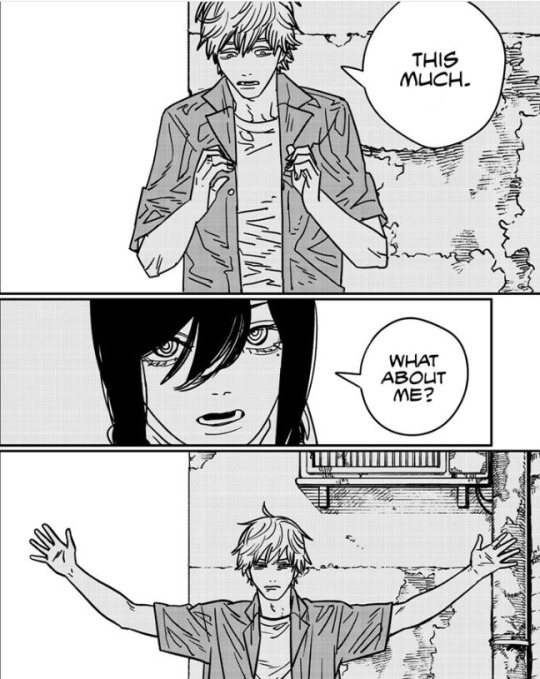
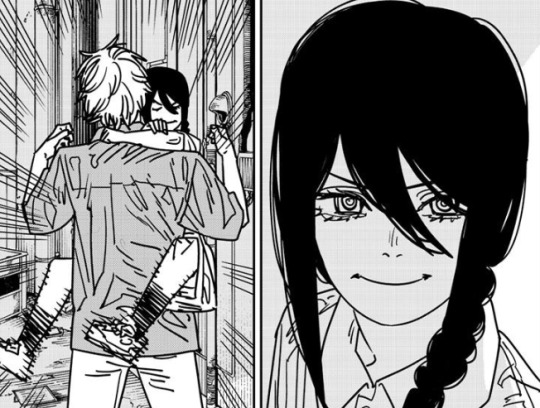
Though Kishibe DID see Denji as the only one fit to raise the control devil, I'm interested to see where goes.
#csm spoilers#nayuta#denji#csm#asa mitaka#fumiko mifune#csm 149#csm memes#csm analysis#chainsaw man 149#chainsaw man analysis#chainsaw man ch 149#chainsaw man 149 spoilers#chainsaw man chapter 149#csm comic#chainsaw man comic#chainsawman 149 analysis
130 notes
·
View notes
Text
CSM 170 COPE THREAD!

THESIS STATEMENT: That can't be Nayuta's corpse at the sushi restaurant. Please GOD it can't be.
Exhibit A: Nayuta has a mole under her left eye

The severed head does not.

It's a little hard to notice the mole sometimes in earlier chapters, but it's very plainly not there on this extremely detailed drawing, arguably one of Fujimoto's best all year.
Exhibit B: The Control Devil's memory alteration powers were still in play by the time War and Denji kissed in the alley.

The semi-decayed state that the severed head is in doesn't match up timeline wise with this effect lifting. It's more likely that it's a similar condition as when Angel's memory was lifted - moments of extreme emotional distress on the person whose mind has been altered can end the amnesia.

Exhibit C: I don't want it to be her.
In conclusion, please GOD let her be alive.
#csm#csm part 2#csm part 2 spoilers#csm spoilers#denji hayakawa#denji csm#csm denji#nayuta#csm nayuta#chainsawman#analysis#please please please
40 notes
·
View notes
Note
I don’t think you can isolate the kanji 夫 the way you can with 厨 in mizushi. In English, it would be as if we were to interpret the word “salesman” to carry a secondary meaning of “sales husband” or “sales lover” because the word “man” in English can also mean husband or lover in isolation, per Merriam Webster. Like that’s just not how a native speaker would interpret those words or construct a pun. I think Gege uses bonpu because it’s a specific Buddhist term, like Sukuna’s not only calling Gojo mid in a general sense, but also specifically a person who has not achieved spiritual awakening.
Prev Related Ask
Oho! But why not anon? Why shouldn’t I isolate the 夫 in 凡夫? Wordplay is a very flexible thing across all languages.
In English you give me the example of “salesman” -> “salelover”. And I don’t think that’s quite right. What’s going on here is much more like “red rum”=“murder” from The Shining.
(Spoilers below the cut.)
A native English speaker coming across "red rum" in isolation would not think to combine the two words and read it backwards. The context of The Shining is what makes us realize there’s more to it than “red” and “rum”. Upon reflection (in the mirror) the “red rum” becomes “murder”.
This doesn’t mean the “red rum” is only “murder”. The clever thing about this wordplay is that both readings represent something in the story.
The Shining is about an alcoholic man, Jack, losing his mind while isolated at a decaying hotel for work and trying to kill his family. It's his son that starts saying "red rum" early on in the story. (The hotel is also haunted because it’s built over the graves of murdered indigenous people and there's other supernatural stuff going on. I think that’s important to know too.)
Rum, a type of alcoholic drink, is a nod to the root cause of Jack’s problem, the alcoholism. Red is a recourring color in both the book and the movie that seems to represent a lot of things within the narrative. The red on cheeks flushed in drunkness or anger, the blood of those spilled within the hotel’s grounds, a warning sign of danger… “Being in the red” is also a problem for both Jack and the hotel’s finacial state. (And Jack’s mental state too.)
Murder is the danger Jack poses and the reason the hotel exists in the first place.
It’s also noteworthy that a child (Jack's son), who is probably too young to fully grasp concepts like death at the hands of a caretaker, is trying to communicate this danger in 3-letter words that aren’t understood by the adults around him. He’s also copying or mirroring what something else is telling him.
It’s a warning of what’s to come and why it is happening while reiterating narrative themes, but that requires both readings. There’s not one reading or the other, both are happening at the same time. And the only way we can conclude this is by considering the rest of the story.
And if you want to see really abominable wordplay that just breaks all the rules in Japanese, please read Umineko. It’s spoilers to discuss how insane and niche it is, but it make sense for the story because the characters are unhinged weirdos that enjoy screwing with people in esoteric ways that drive you and the people they’re tormenting crazy. (Those who have read know Exactly what I’m talking about.)
(Very mild Umineko spoilers.) Being able to solve the ridiculous wordplay riddle in Umineko requires that you understand the particular neurosis of the character that created it. This character loves both Japanese and English word games and literature. Even though the riddle is written in Japanese, you use that knowledge of this character’s westaboo tendencies to recognize that some of the kanji are secretly representing English letters. And those kanji have to be isolated and read a different way using hints contained within the riddle. (Aka no native speaker would think this way normally. There’s a good reason this thing didn’t get solved for YEARS. Massive Spoilers for proof of this. Shout out to the one person who managed to do it before the solution was released, well sort of.)
I’m using all these weird examples because this is the particular kind of freak Sukuna is. If it were any other character, it would be reaching. But because he is a literature nerd that bends and breaks the rules as he wants, his Dismantle and its kanji doubling as cutting to understand/solve, and the fight being framed as a date, there is a very real chance he meant the mid husband on top of the ordinary/unenlightened readings (religious connotations too). All these readings are to be taken at the same time because Sukuna truly is [redacted] Umineko.
#cactus yaps?#I think this argument style qualifies as Beatoposting.#Chainsawman also does weird wordplay stuff if you want more examples. See: The Birth Devil Theory. And why the Falling Devil is a chef.#I wonder how often Sukuna has been doing this. I know he does this when there’s attention drawn to the kanji.#Usually by emphasizing it in brackets like with Keikatsu/Enchain. Or it’s an isolated bubble like Kozo with Yuji or Ine with Haruta.#Also in a completely different analysis I leaned into the religious angle of Bonpu but it's a very difficult and upsetting read.#asks#jujutsu kaisen#ryomen sukuna
15 notes
·
View notes
Text
chainsaw man chapter 122 thoughts
when i first read through the chapter i noted it was odd that fami ordered so much food until i scrolled through tumblr and saw that @possiblylando (sorry for the random ping/notification if this causes one, im still getting used to tumblr and i didnt want to take credit for an observation i didnt make) made the big brain observation that it's probably to do with fami being famine. akdjjwkxnd good catch. that makes me wonder if fami eats irregularly due to her nature or if she's always hungry?

we saw earlier that yoru's goal is to make chainsaw man return nuclear weapons, presumably because that will lead to more fear of impending warfare, which will, in turn, give her power boost. we don't know her motivations for this right now. rivalry with the 3 other horseman devils maybe? or something more?

this probably goes without saying but yoshida's comment about the 7/30 convicts dying this week and what we've seen so far makes me think that the convicts are just going to be fodder in some grander scheme, possibly on a city-wide scale, along with a whole lot of others.
it wasnt exactly made clear but since the devil's body was made using the body parts of the people living in the apartment building, were they killed solely for that or can they be reanimated in some way and used in battle like the dolls from part 1?
im kind of forming a loose theory here, and it'll probably be way off, but i wonder if the ability of this primal fear devil is scent based? at the time nayuta says she smells "the nastiest devil scent... i've ever smelled!" (chapter 121) denji is forlorn and hopeless like we see with the couple who jump off the balcony in 122.

i also want to point out the menacing shot of denji's building. maybe fujimoto is trying to say something here?
but like with the failed spinal cord sword, denji shrugs it off.
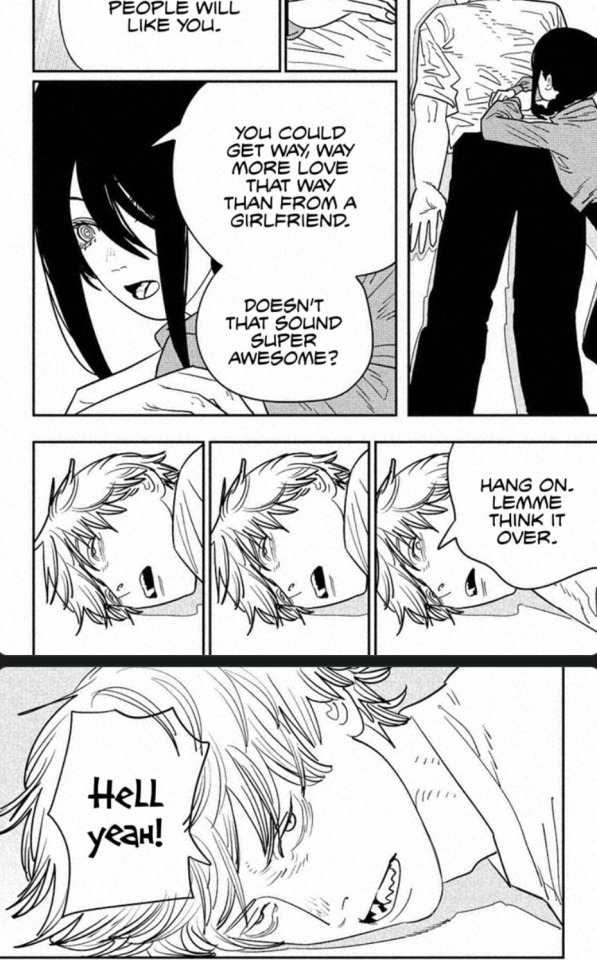
since nayuta isnt affected and denji also isnt really affected, maybe it has to do with pochita's influence on his physiology?
in that vein, we see asa on the street probably not too far away also extremely down on herself. so much so that yoru even feels compelled to say something.
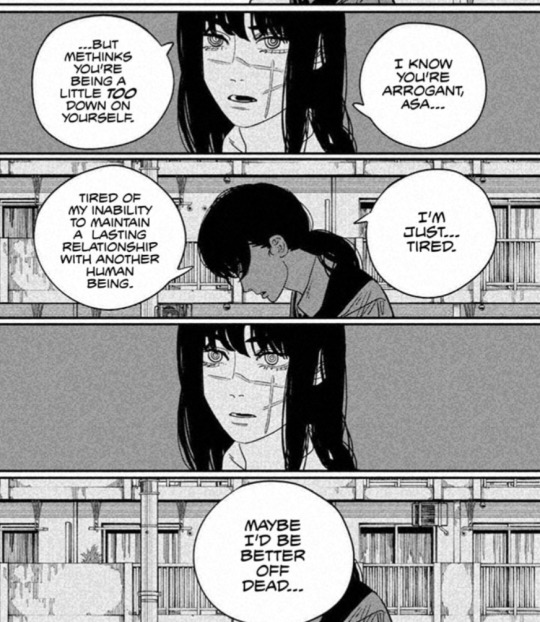
keep in mind, this isn't the first time asa beats herself up, but it IS the first time yoru says something about it.
and what's happening right at the same time?

rip.
now, onto the next topic.
nostradamus's prophecy of the 1999 apocalypse. im not going to post the poem since it's already floating around but I'll share some thoughts i had on it.
like others are theorizing, i think its fujimoto's way of laying out exactly what will happen from here on out. blatant foreshadowing.
war wants to find and kill chainsaw man to take back the ultimate weapon; nuclear weapons. the primal fears, plural, will set the stage for the arrival of the final boss, nostradamus's king of terror, aka death, who is also one of the 4 horsemen.
that said, im gonna jump around to the couple's conversation:
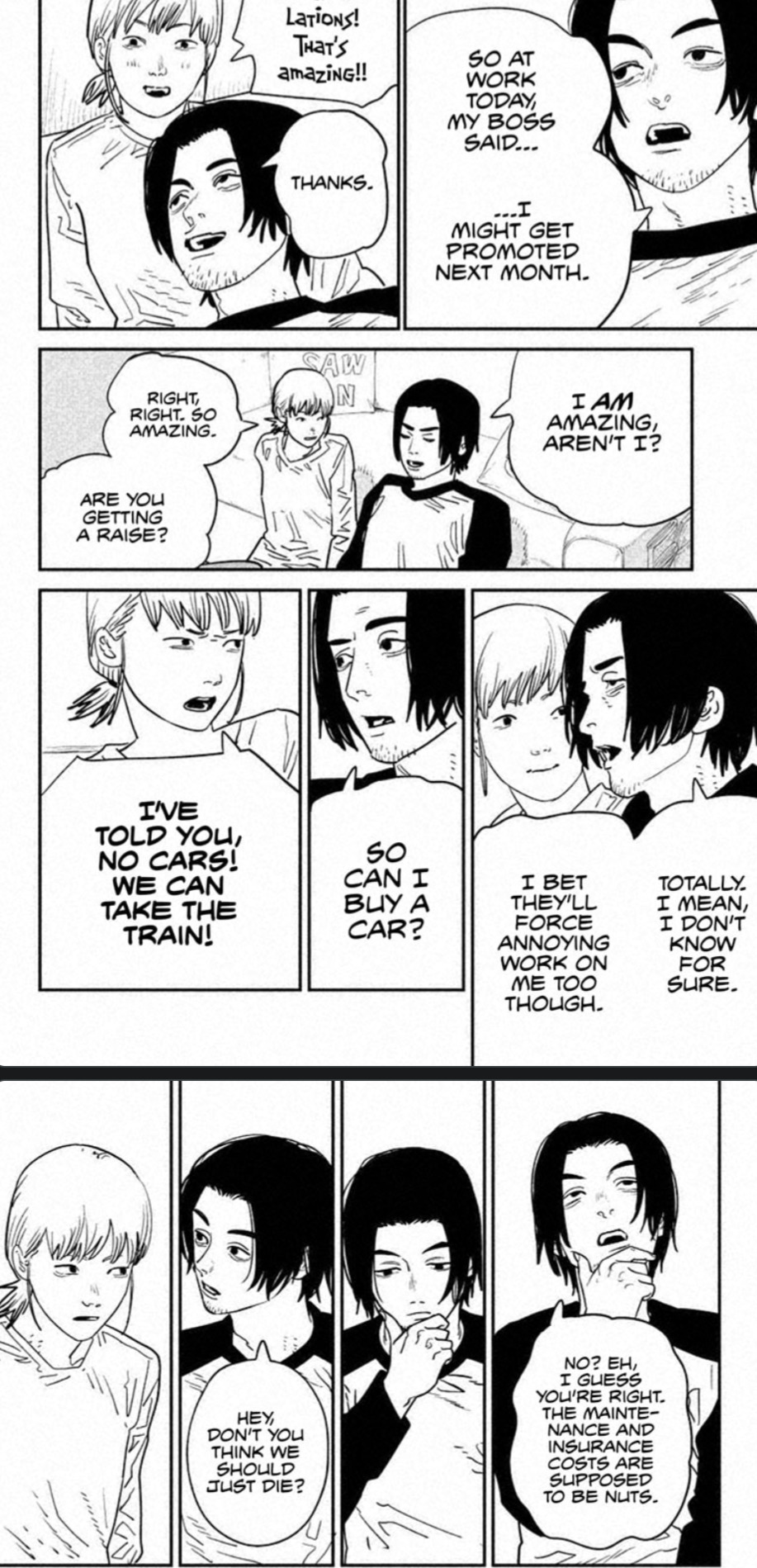
the man started off excited about what's essentially a mundane achievement. his wife? girlfriend? is happy for him until he asks about a car. right here is where we see the change from calm to...not sad but apathetic and acceptingly hopeless. at the slightest negative statement that he would not be allowed to get a car, and it's implied that they've had this conversation before and that it isn't the first time he asked, his negativity overwhelms him, transfers to her through whatever is causing this mental shift, and they go to the balcony to jump.
there he eyes a car that looks...
well.
it looks like kobeni's car.
that's either a red herring because fujimoto is a troll or maybe that's where the actual primal fear devil is? it could also be a nod towards what denji was capable of doing; getting up and keeping going towards the same goal. for denji, love. for this guy, a nice car.
as for which primal fear this devil represents, my guess is despair. in war you must have ambition, especially as a leader, and resolve as a soldier. without resolve, you die. what power does war and emotion have when the opponent is empty and untouchable?
but then i remembered what the four horsemen of the APOCALYPSE aka the four horsemen of death were, and i doubt im going to be right about that. we know this primal fear devil isnt control, because that's nayuta, or famine, or yoru, and most likely, as in most probably definitely, not death.
so i did a light google search and saw that control/conquest is sometimes alternatively called pestilence/plague. maybe fujimoto is making 5 horsemen of the apocalypse? if it actually is pestilence, it could explain the smell. disease has a noticeable stench.
i think that more or less sums up my thoughts on chapter 122.
im interested in hearing your thoughts and starting a dialogue in the comments!
thanks for reading.
#chainsaw man#chainsaw man manga#chainsaw man part 2#csm#csm manga#chainsaw man theory#chainsaw man analysis#anime and manga#manga#famine csm#yoru chainsawman#csm denji#asa mitaka#denji chainsaw man#nayuta
73 notes
·
View notes
Text

3 notes
·
View notes
Text
Log of my rewatch of Chainsaw Man now that I've read the manga, lesssssgooooo.
Chapter 1
Spoilers ahead!
.
.
.
1. The door was there from the very beginning, THE DOOR WAS ALWAYS THERE.

2. I have this thought that Denji found Pochita right after his last fight with Makima and that's why he was so small and hurt and apparently weak.

3. Still can't get over that his dream was to have some jam with his bread.
4. All during the zombie attack he's protecting and holding Pochita. My heart can't take it.
5. He offered his body and life to Pochita unprovoked because he loves him.

6. When he wakes up he's just really sad Pochita's gone.
7. Denji being in an existencial crisis about him dreaming for more and then going absolutely berserk gives me life.
8. Idk how Makima didn't lose it the second she saw Denji as Chainsaw Man, could it be because of the smell that she didn't fully recognise him?
9. The music they play when she first embraces him as he's fainting, so nice, peaceful and comforting after all the bloodshed Makima's manipulation started right there both for Denji and the audience.
10. Makima, despite literally saying he can either die or be his pet, holds him in a very nurturing even maternal way, making Denji (& us) think that despite seeming a bit harsh she can be caring and loving. She tricked us from the very start!
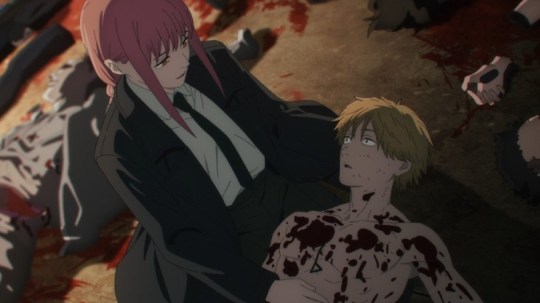
#Chainsawman spoilers#csm#pochita deserves everything#my poor baby denji#protect Denji#reactions#chainsaw man#chainsaw man reaction#tatsuki fujimoto#fujimoto damaged me for life#the door was there#chainsaw devil theory#chainsaw man theory#chainsaw man analysis#nothing else to do#analysing media#blurting out my life#i dont post on tumblr#common placing#favorite anime
12 notes
·
View notes
Text
I JUST READ today's chapter and ohhhh I want to bring this back because ch165 could not be a better thesis chapter for part 2.
And it's extremely elegant how it was delivered.
We have our little group getting on a train to go and find a sushi restaurant where Denji can eat. The setting is apparently mundane, typical for young adults their age. Kids going out to eat with their friends.
After all, Asa is trying to make Denji get his "normal" life back.
The problem here lies in Asa's assumption of Denji's character.
She THINKS Denji has a normal life he can go back to.
And so we see this constant dichotomy highlighted all throughout the chapter: there's barely any sushi restaurants because the workers have died or they have been destroyed, the other people on the train are injured instead of tired from their daily work, the buildings in the distance that frame our landscape are destroyed. Asa clings to a normalcy that isn't even there, not because she is trying to make routine out of a catastrophic situation but because that internalized dichotomy hasn't settled in. She thinks she can always go back.
Because while she HAS a "normal life" to go back Denji has never had one.
This is not Denji's turning point, it's Asa's.
Because her character is a constant contrast to Denji.
While Denji is the only one to aknowledge their situation, the deaths, the destruction, and the fighting, the ridiculousness of it all; Asa is oblivious to it. Clinging to the need of returning Denji to a life he never had.
While he has absorbed Pochita since the beggining, making it difficult to know where Chainsawman ends and where Denji begins (let's remember Makima telling him that how Denji acts as CSM is not how a devil like him should behave); Asa's arc is all about learning to work together with Yoru. There's some prevalence of the "double identity" trope in her character just as in Denji's, just that hers is quite more literal.
And ironically enough, while she has never kept her identity secret unlike Denji, it is her who clings to the compartimentalisation of their lifestyles.
She assumes Denji had a regular life with regular friends and chores. She assumes Nayuta is a regular sister, a normal kid. She thinks their apartment building burning down is an unlucky tragedy that can be fixed and not a fundamental shift in Denji's life. We could even argue that CSM is the only thing that has allowed Denji to have a taste of what a "normal life" for people would be.
Which is why Asa is working with a faulty premise.
Asa has brought war, and that is something she can't even begin to understand.
You can't really blame me for headcanoning Denji's narrative as somewhat trans coded.
There's something about the body horror of Chainsawman thats so alluring to me, not in a purely gorey way. The imagery of ripping your body to shreds to become the Chainsaw. Of people ripping out your heart, others taking your blood. Some your legs and arms.
The feeling brought by the lack of agency in one's body.
Or rather, how people exploit and abuse their external perceived conceptualitation of your body onto you.
Chainsawman the demon.
Chainsawman the hero.
Chainsawman the monster.
Chainsawman the idol.
Chainsawman the heart.
Chainsawman the reaper.
What about Denji.
The brother, the caregiver, the classmate, the son, the friend.
Are these separate? Which one is fake? Is there a fake one? Are they the same or is one a shadow of the other? A front?
Is chainsawman denji? Who is Denji?
This separation of self, the compartmentalization of Denji's reality as seen by everyone else.
If Part 1 was about creating Chainsawman
Part 2 is about who is Chainsawman, the idea of him.
And not what he is for other people only, Denji too.
How it reaches a point in which it even becomes a maladaptive coping mechanism, self harm.
Denji craving the blood and violence and pain not because of hunger, but to numb out the dissonace.
How that dissonace is boosted even further by the fact that all the people that have seen Denji as he is have long left him or suffer because of their closeness.
There's a certain parasociality in all this mess.
How people latch onto their false constructed idea of the Chainsaw, of what it's supposed to be, what it's supposed to do; even if that's not reality, if it's not the truth, even if they dont fully believe it themselves.
How Denji is forced into it even if clearly it's not something that he especially enjoys. Not in a healthy way anyways.
How one becomes a symbol, whose meaning is given to them by others, not by oneself.
That objectification: the creation of an idol, myth. Fiction.
25 notes
·
View notes
Text
A small Chainsaw Man Analysis
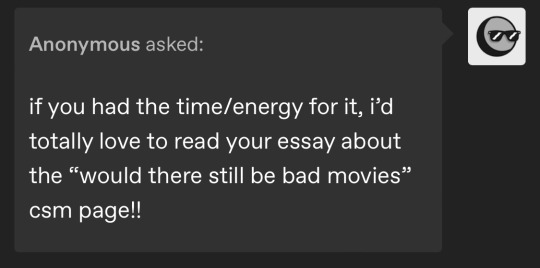
They're referencing this post:


(Sorry i can't respond to your ask directly, tumblr kept crashing)
LMAO ok Anon you win but I can’t promise this will be very articulate or coherent
Ok so when I first heard about Chainsaw Man I heard it was The Manga Of All Time and the anime has been Majorly Hyped and Everyone Loves It so I was curious. Then I went and watched the anime and I was like ‘huh ok I mean. It’s good but it’s not like mindblowing.’
Then I read the manga all the way to the end of part 1 and I understood.
So the world of Chainsaw Man is set in a Fucking Bleak reality. Like, overwhelmingly so. The fact that devils exist and can murder humans on a whim and it’s basically treated as an unavoidable inconvenience because how the hell can you stop them, really, when they’re functionally immortal? The best you can do is kill them, send them to Hell, and hope they don’t die there and revive back on Earth. The protagonist is a 16 year old orphan who sold parts of his body to pay off a “noodle incident” debt inherited from his father, and then the kid was murdered by the yakuza he owed money to because they decided they liked devils, actually, and didn’t want him around killing them. In CHAPTER ONE. Why would anyone enjoy reading about a story set in a world like this?
Because of Aki, and Power, and the family Denji created with them. It takes a while for the ball to get rolling in the story, because they’re strangers at the beginning, but any manga reader is gonna know what I mean when I talk about how they love each other. Denji comes across as a sex-obsessed, horny teen, but that’s just because he craves emotional intimacy and sex is the only way he thinks he could get it. The truth is that his shower/bath with Power was the exact kind of vulnerability and intimacy he was craving, and it WASN’T sexy. The narrative didn’t treat it as sexy. Denji even notes that it wasn’t sexy, to his surprise, but it was nice to be able to be vulnerable with another person. Then there’s Aki, who imprinted on Denji and Power so hard he straight-up was considering quitting being a devil hunter so he could just live a normal life with his new family. He was willing to abandon his obsession with the gun devil, something that he’d been driving his will to live for years, for them. It was Himeno’s death and the letter he read that made him realize that the life of a country mouse might not be so bad, if it’s with the people he loves. (I know that’s a loaded sentence out of context but manga readers know what I mean when I bring up the country mouse, right)
I bring all of this up to show how even in a grim, dark, depressing world like Chainsaw Man, there is hope; and that hope comes in the form of love. Love in a general, not romantic, sense. Love of having toast and jam for breakfast, love of a movie, love of a family.
Now, to Makima.
Makima is Really Fucking Goddamn Powerful. She is literally reality breaking, almost as much as Chainsawman. (For the purposes of this essay, I’m referring to Pochita/Chainsawman and Denji as separate entities.) Makima is able to control anyone so long as she feels she has power over them, and she has a contract with the fucking Prime Minister. That’s a terrifying power. She’s literally the manifestation of the fear of being controlled.
And that’s a lonely existence.
Pochita/Chainsawman says it himself. When you’re so powerful, you struggle to make connections with people. Either they worship you and put you on a pedestal, or they fear you. You can’t get close to anyone, no matter how hard you try. The only way Pochita was able to do so was because Denji had no idea who Chainsawman was.
Makima doesn’t show this emotional weakness of hers, because it directly opposes her powers. If people saw her as needing connections with other people, they wouldn’t respect/fear her, and she would literally become weaker as a result. (The same way that as Chainsawman becomes more beloved by the general populace as a Hero, he becomes weaker.) But there’s a point where we, the audience, get to see this side of her. In her date with Denji.
Quick recap (of one of the best chapters in the whole manga, thematically): Denji and Makima go on a date at a movie theater. They sit and watch like six movies in a row over the course of the day. The first five are packed with people and are funny/entertaining, but not very deep. Neither Denji nor Makima are very impressed with these. Then…I’ll just post the comic here.
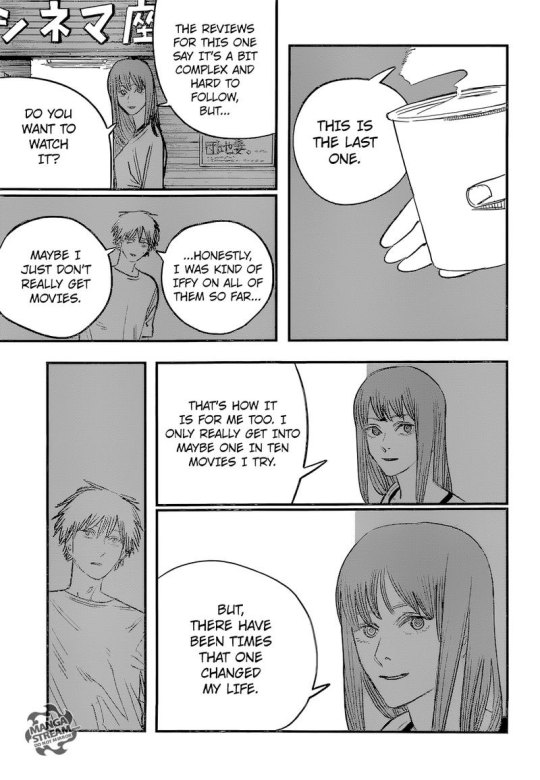
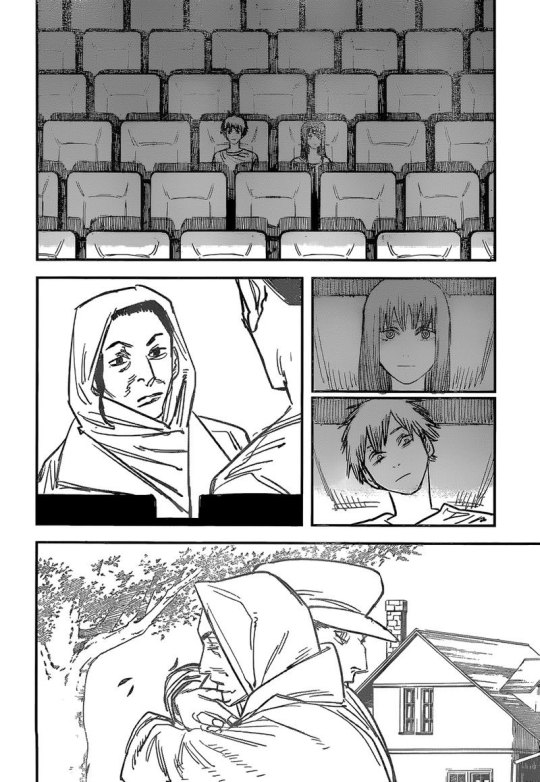
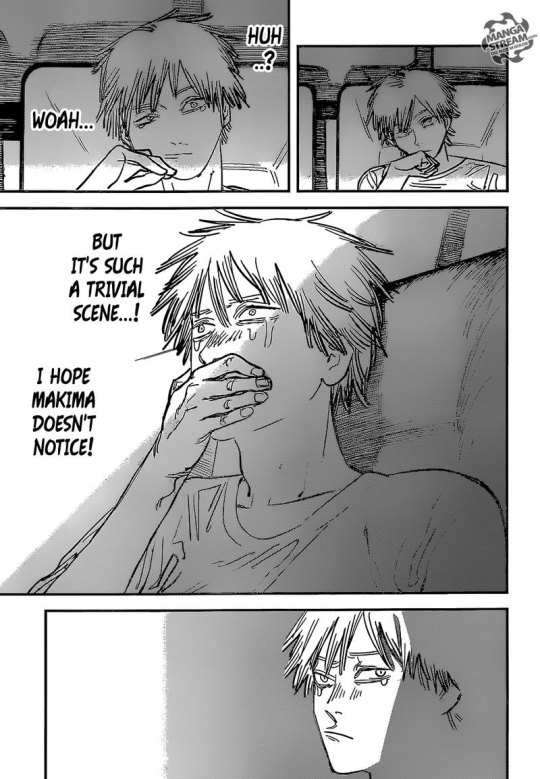
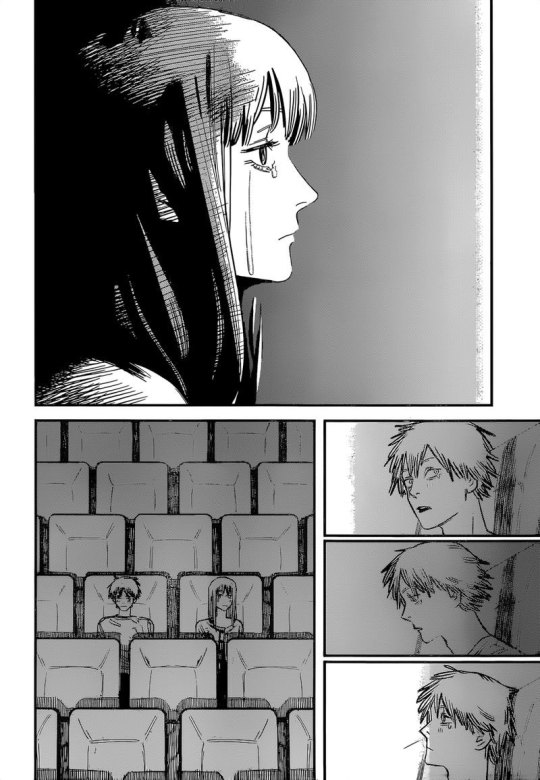
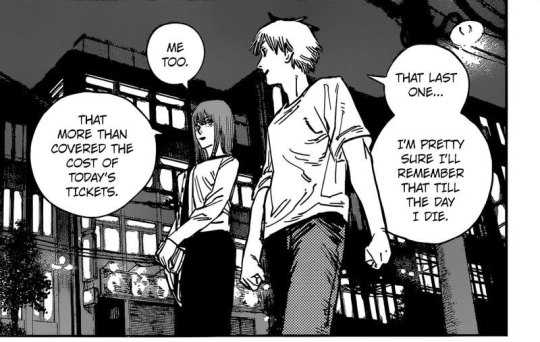
The final movie they see is more of an indie arthouse film. Most importantly, it shares an intimate, vulnerable moment between two people who hug. Denji cries because he sees this thing he craves, as I’ve elaborated on. Then he looks over and sees that Makima is also crying. We already know why, as Pochita said: she is unable to get close to anyone, due to the nature of her powers and the nature of her being a devil. Because of this, Makima craves connections with other people.
Makima straight up tells the audience why she’s doing the things she’s doing. If she has control over Chainsawman, she can have him eat other devils and create a world where those fears never existed. She truly, honestly believes this would make a happier life for humans. But the problem with that mentality is that in a world without bad things, in a world without fear…there’s no good things, either. How do you tell how “good” a good thing is, if you have nothing to compare it against? How can you tell that one in five movies is “good”, if you don’t experience the other four?
Why would anyone enjoy reading about a story set in a world like this? Because despite all of the horrible things that happens, love exists. It shows up over and over and over again. Love exists. It was there. It mattered. It was worth fighting for.
That brings me to the conversation between Makima and Denji I love so much, and why the end of Part 1 works so well.
Makima thinks that a world without bad movies fear would be better. She thinks that in this world, she could be loved. She thinks that in this world, humans could be happy forever because they never suffer hardship.
And Denji knows for a fact that that's wrong, because without bad movies, the good movies don't stand out. You can't say that jam and toast is a great breakfast if all you've ever eaten is jam and toast for breakfast.
And that's why Makima is tragic (because she's never experienced the love that Denji has, and never experienced the hardships he has), and that's why Makima is wrong.
And all of this, the whole conflict of the story, is summed up in three lines between Denji and Makima in a graveyard. It's perfect.
#it's also why i love makima. she's such a great character#chainsaw man#chainsaw man spoilers#chainsaw man analysis#csm#csm spoilers#makima#denji#denji hayakawa#op#axbox#anon
614 notes
·
View notes
Text
more angel csm posting time for my csm loving friends and followers
chainsaw man fans please interact
spoilers for up to chapter 126, you have been warned
lets figure out who tf this guy is


lets consider what we know -this character is wearing a public safety uniform or male school uniform -they have white sneakers -they have some kind of thin blade (appears to be a sword/katana?) -they address csm as “chainsaw man” and speak quite strongly so who are our suspects?
well there really arent too many characters who wear white sneakers actually so we can narrow it down to -kobeni -angel -yoshida -kobenis brother
id cross of kobeni and her brother right off the bat. neither of them speak with a strong tone of voice and kobeni only carries a kitchen knife, not a thin blade (and i doubt her brother would just happen to carry around a katana)
many people claim yoshida, but he doesnt talk like that. in the original japanese text this voice is more formal (as if talking to a superior) while yoshida talks to denji/csm very casually. dont really see why that would change here
my number one suspect is angel, as he -wears a public safety uniform -wears white sneakers -has open access to blades/katana due to his power -is a known worshipper of lord chainsaw, so would refer to him as a superior
ive also looked at the characters hands and the camera angle the hands on our suspect are too small to be yoshidas and not slender enough to be kobenis/her brothers and the camera angle cuts off JUST before the tips of angels wings could be shown


in conclusion i think our mystery man is angel. case closed
#adhd hyperfixation moment#i spent over an hour on this. btw.#chainsaw man#csm#angel devil#chainsawman analysis
14 notes
·
View notes
Text
Makima and Motherhood
The symbolism Fujimoto uses to connect Makima to maternity is something that really stands out to me in CSM part 1. Even without the visuals, Makima’s demeanor alone is very “parental,” (not necessarily in a good way, but she still has that presence about her.) To be clear, this analysis will focus more on the connection between Makima and motherhood, the symbolism Fujimoto uses, as well as the irony behind it. I plan on doing an entirely separate analysis for her character in general.
Before getting into the manga, I want to point out some of the imagery used in the anime. A very well known frame from the anime comes from its third ending. Makima is depicted as the Virgin Mary, floating in front of a kneeling Denji, who looks as if he’s worshipping or praying. A lot of people use this scene for bf/gf memes which I kind of find funny (and low-key Freudian). The visual is not really emphasizing Denji’s infatuation with Makima but rather her control over him, which stems from Denji’s desire for a mother figure.
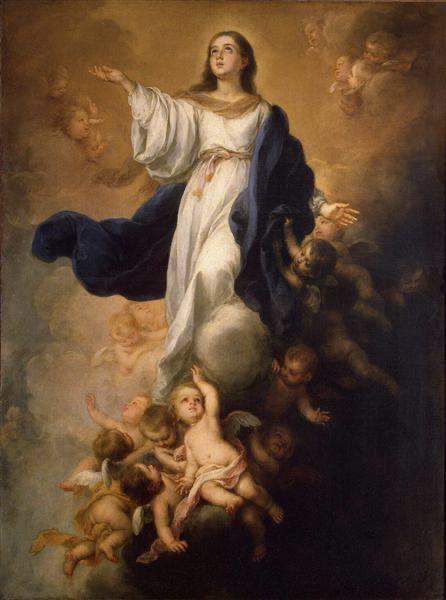

One of the most misinterpreted parts of CSM is Denji and Makima’s dynamic. People often describe Makima as someone who used seduction to manipulate Denji but that’s not really the case. However, to say that she didn’t explore this tactic in the beginning of the manga would be a complete lie. Where she really becomes a mother towards Denji is, ironically, on their movie “date.” The movie theatre scene is a crucial moment for both of their characters but I’ll touch on that later.
For many people, mothers are viewed as this authoritative role model for most of their childhood. Anything she says or does must be correct because she is your mother. It’s easy to look back when you are older and call children stupid for it, but it’s natural instinct. Mothers for many are a source of security and comfort. That is what Denji saw in Makima. That is what Makima wanted Denji to see in her.
When reading CSM, it’s obvious that Makima groomed Denji but I feel like not many people acknowledge how she groomed him and why it’s so disturbing. Like I said earlier, it’s true that she explored seducing Denji but she abandons this idea once she realizes what it is Denji truly longs for, even if he doesn’t realize it himself. He wants the security and comfort only a mother and a family can offer, so she provides exactly that for him. What’s ironic about it is she’s giving Denji exactly what she wants, which probably contributes to her jealousy and hatred for him. What she’d Denji into such shock at the end of Part 1 is that on top of the people he cared about being killed, he learns that the only person he had was 1.) not really a “person” at all and 2.) hiding her animosity towards him in order to manipulate him. I can only imagine how baffling it must be for your own “mother,” who’d showered you in affection since the day you were born, to all of the sudden flip the switch in the cruelest way imaginable.
Also, it is important to understand that multiple things can be true at once. Makima was never attracted to Denji romantically, sexually, or even platonically. In fact, she makes it quite clear at the end of Part 1 that she views him as insignificant and distasteful. It’s a bit shocking considering how much attention and effort it would take to manipulate someone like that. However, this doesn’t change the fact that she groomed him.
It’s common for their to be some sense of attachment to an abuser, especially in a familial scenario like the one that plays out here. A very sad and disturbing part of all of this is how Denji, despite everything Makima has done, is extremely hurt by the fact Makima cannot even remember his scent let alone his face. That being said, I love how a huge reason Denji defeats Makima is because she only recognized Chainsawman’s scent, not Denji’s.
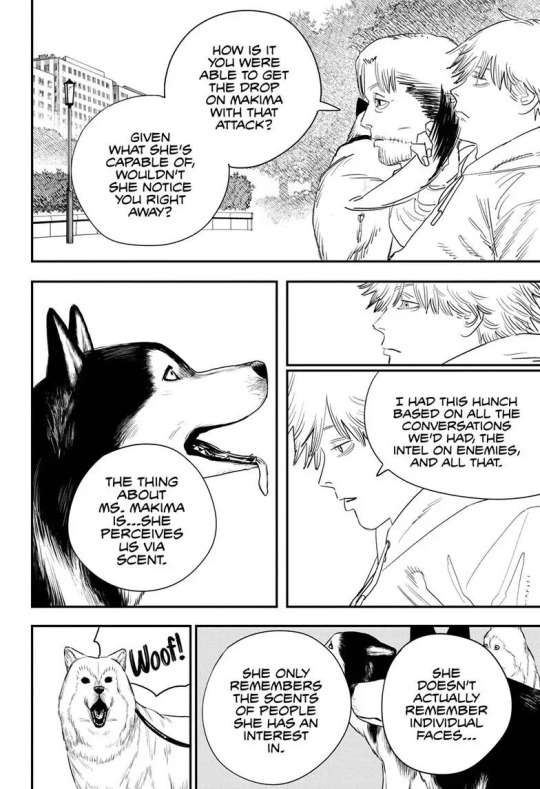
Although it’s sad, I do like the way Fujimoto hints at Makima only seeing Pochita, not Denji. For example, every time Makima and Denji hug, Makima puts her head on Denji’s chest, right over where his “heart,” Pochita, is. My personal favorite detail is the image of Makima reflected in the chainsaw’s blade. Even as Denji is attacking her, her eyes aren’t focused on the assailant but the weapon because it is a chainsaw. It’s a really creative way of showing that Makima’s fixation was solely on Chainsawman, not Denji. She didn’t even recognize Denji without Pochita as his heart.
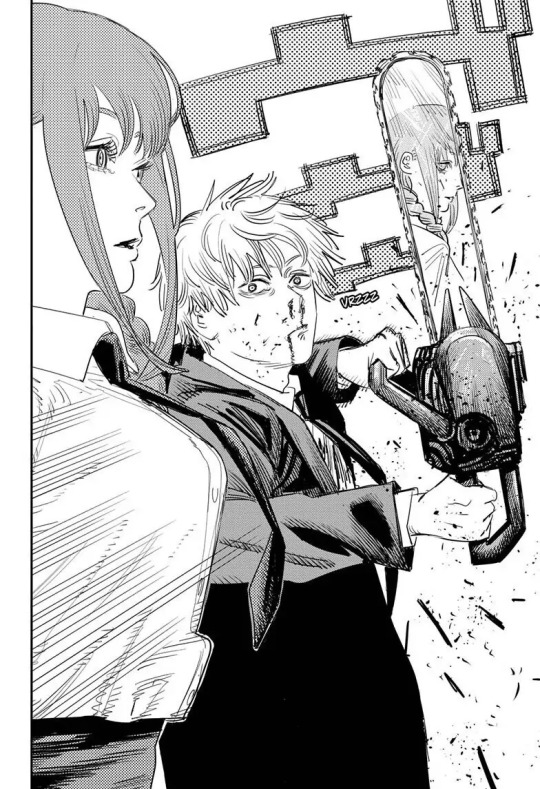

As I mentioned before, Makima is depicted as the Virgin Mary a lot. Despite being such a dark character, she’s often engulfed by a warm light in these images to compliment the illusion of safety and love she creates. One of these comes from Chainsawman ending 5, where for a brief moment a painting of Denji and Makima, that is a reference to Michelangelo’s “La Pietà,” can be seen. The reference to this famous sculpture is another nod to the mother-son dynamic between Denji and Makima as well as a way of foreshadowing Makima’s intention to bring Chainsawman back, but let Denji die in the process.
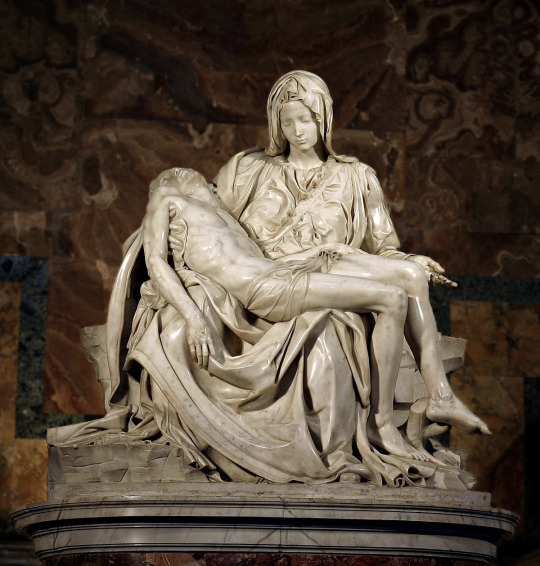
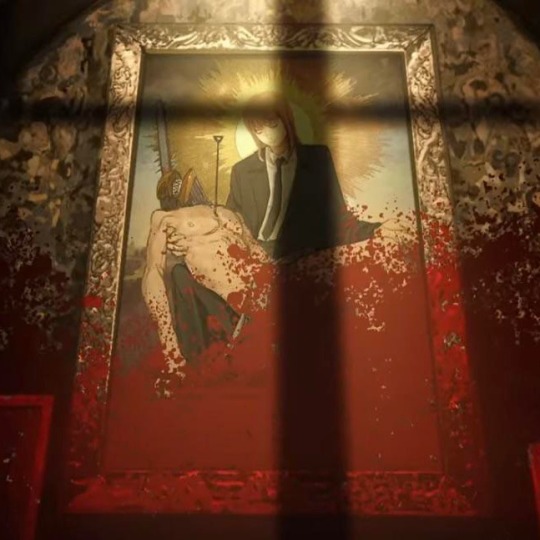
**Another cool detail is how the shadow of the window pane looks like a cross. I love all the religious symbolism so much.**
Another interesting part of their dynamic is the idolization. Denji puts Makima, someone who doesn’t care about him, on a pedestal. He sees her in a divine light. Interestingly enough, Makima admires Chainsawman in a similar way. What Makima and Denji have in common here is that neither devil they look up to truly acknowledges their existence as an individual. This is just one of the many ways in which Makima and Denji parallel each other.
An iconic yet ambiguous part of the manga is Denji and Makima’s movie theatre hopping spree. (On a separate note, that actually seems like so much fun.) They culminate their movie marathon with a Soviet film called “Ballad of a Soldier.” To better understand the manga I watched this movie on my own and I can confirm, it’s sad. Makima’s emotional response to it is probably the most memorable part of the entire ordeal. She sheds tears as the mother and son embrace in the film.
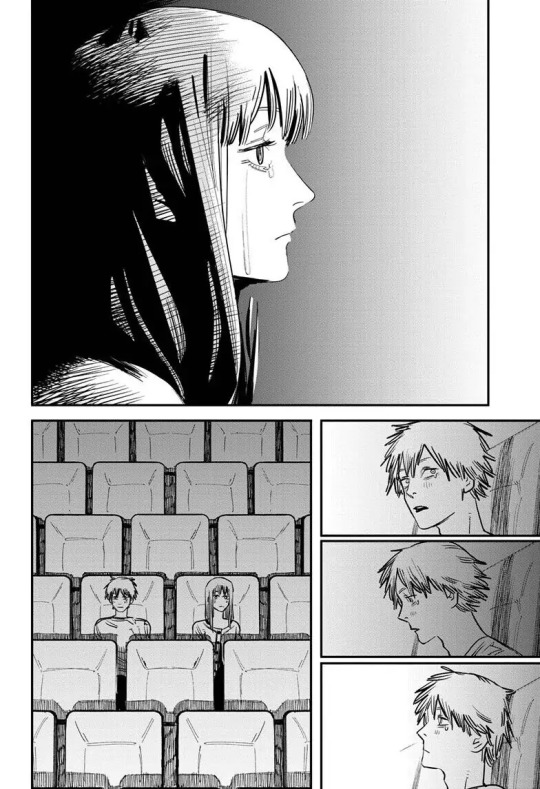
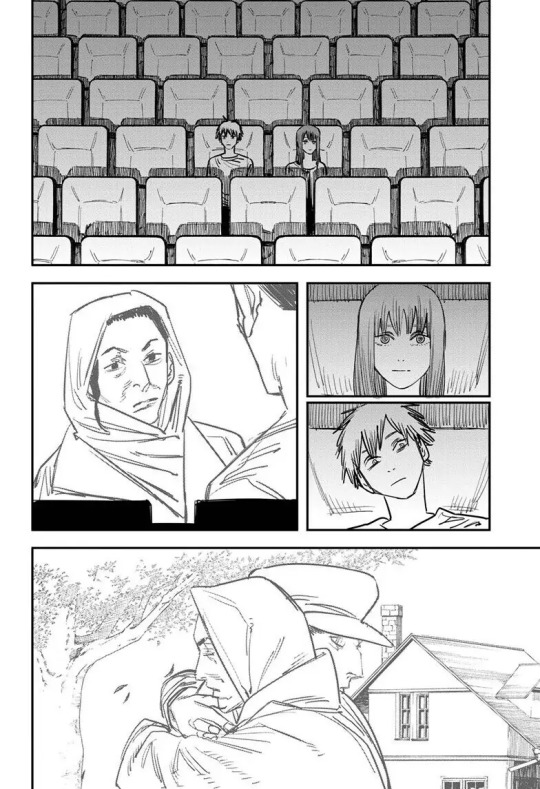
A person might cry during a movie because they can sympathize with the characters or situations. It’s difficult to realize this unless you take a step back and ask why a certain scene made you cry, because it’s a lot more than “it was sad.” In Makima’s case, she is not crying out of sympathy, but out of yearning. The relationship depicted in the film is what she wants. Denji is crying beside her as well because he also wants that type of relationship. They both want a family, a stable source of security and comfort. This scene is also alluding to what Pochita tells Denji at the end of part 1. He tells Denji to give Nayuta lots of hugs, to become the family Makima didn’t have.
It’s also interesting how Denji and Makima’s roles flip in part 2. Obviously she is no longer Makima, as her new incarnation is Nayuta, but I believe this was very intentional. Denji sort of becomes a parental role model to Nayuta, much like how Denji viewed Makima. Only this time, it’s genuine. Another reason I really like Nayuta’s character is because of how different she is from Makima. It’s fun to compare and contrast their characters. I really love the parallels. Character design wise, I like how Fujimoto kept the braid. It’s symbolic of not just the control devil’s chains, but bonds.
Speaking of chains, the chains coming from Makima’s womb are also symbolic of maternity. The first time she’s shown using this power is during the infamous Gun Devil showdown. It seems the chains grant her the ability to use the powers and contracts of other devils and humans. The chains seem to connect to the navels of those she controls, acting as an umbilical cord of sorts.
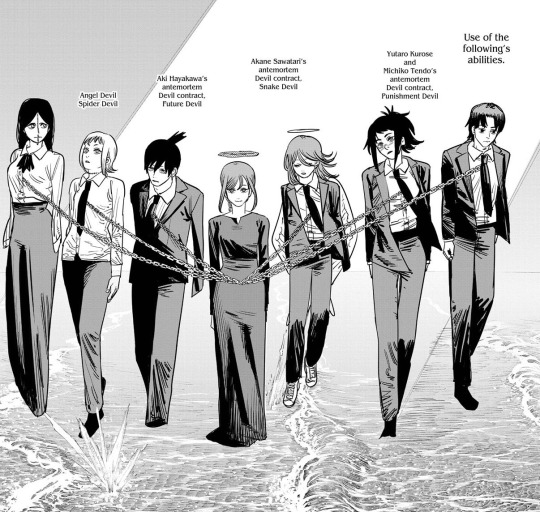
Obviously the uterus to navel connection is symbolic of motherhood, but why chains? The chains are also symbolic of the dynamic between Makima and other characters. She can’t form genuine connections, so she uses her powers. The chains are representative of how people’s admiration of her isn’t a choice. She’s using her powers for her own agenda, but she also may be trying to feel less lonely. However, even she knows it doesn’t substitute a real relationship. Her power requires her to have a superiority complex, and it’s her nature as the control devil that makes it so hard to achieve her dreams. Makima does understand that all of her relationships are superficial, and it bothers her.
Despite all of these roadblocks, it is not impossible for the control devil to form a bond. Pochita knew this and Nayuta is proof of it. I believe Makima was capable of forming those bonds at one point in her life, but ultimately her upbringing destroyed any possibilities of that happening by the time Part 1 begins.
I post these on tiktok before tumblr because I write them in Pages, and it takes a while to put the pictures in on here. I gave up on my Denji and Doors analysis with the photos but I’ll try to be better about it moving forward because I do think visuals are important.
55 notes
·
View notes
Text
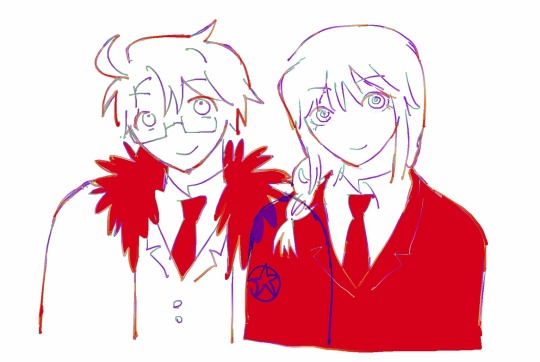
suicide is discouraged in the workplace
im not even gonna try to be coherent here. this is not an analysis post i am braindead. if i was a better artist makima wouldve been my muse when i was deep into chainsawman. actuallt she kind of was but i pussyed out
OK everyone here can subconsciously understand this connection. dont get too hung up on makima's strong motherhood theme and i just thought about what if ame was motherly and i couldn't kill myself right aftee thinking that as i have no means to it. that was a joke its late and im just me. i decided i wasnt a fan of motherly ame though so all suicidal thoughts erased. i am really chill now
old makima fanart i drew that im trying not to rip my hairs out over thinking about it with ame. also dont worry if this makes tou find my mainblog or main accounts whatever

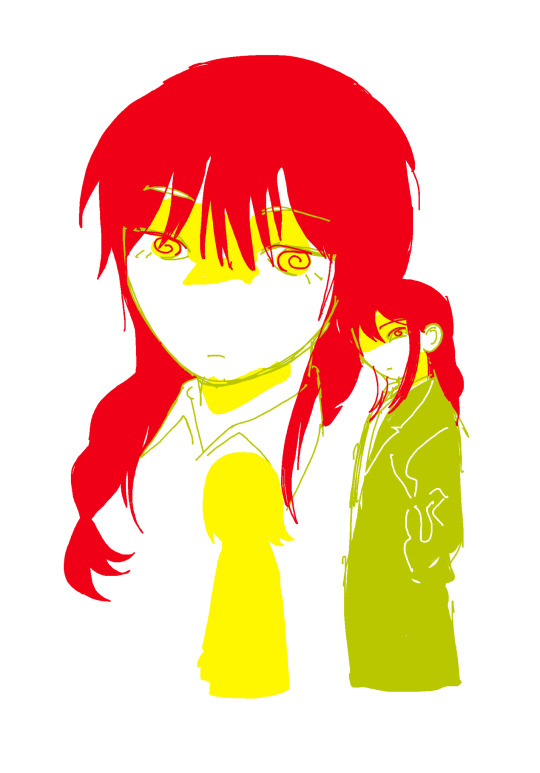
actually theyre really different in many ways now that im looking at these. ame is so much of a son and makima is so much of a mother its like oppsoite spectrums. but thay makes the commonalities fun actuallt. i keep thinking about the movies and makima hating bad movies. ame is not an art kid by any means does he even care of the beauty of the world? i doubt it. but he likes bad movies and he likes cheap entertainment so who knows... they'd disagree on that. well i think makima's opinion on that was pretty extreme so i think most would disagree with her really
i could imagine ame going "Chainsawman. Doesn't spit." and smoking for the first time to look cool like in movies only to pathetically cough. thats their common trait... artifice... humans... but in a way that loops back to being Really Human i guess. holds a kind of arrogance and hubris that is so associated with humanity. it cant be anything else. ame should kill himself i think he should get moments of clarity and awareness and want to kill himself rqlly bad
both concepts of control. awesome. SUICIDE IS NOT ENDORSED IN THE WRKPLACE. ame goes to protestant church once or twice and sleeps because hes useless. makima is baptised and goes to local catholic churches not the cathedrals she supports the local christians.FUCK i just remembered the country mouse city mouse thing. ame is a liar and hates everything and loves everything and never feels content. i like to imagine him as a country mouse so fucking bad i want him to chill out one day and go to those middle of nowheres i know exist in america(can i shove cana in here and get away with it). why are they in the city if they are country mice? because..... you know..... you understand..... another w for eternal unhappiness (refer to title of this post)(suicide is discouraged in the workplace)
they are evil bosses i am the employee and when i ask for a break they gaze at me with a vacant stare and smile and i know in my heart they are viewing me like i am beneath them. i get scared and run away but truth is they didnt hear my request. they do not register individual people
if they met they would know immediately and viceversa. because everyone knows subconsciously because lying is futile and everything melts away. ame:i know a toxic boymom when i see one... okay im kidding makima is a toxic boymom if u push the chainsawman in ur head 🙂 ame as a kind of control devil works inmy head. i really believe ame was a polite child but demanding in many ways. sincerely wanting.
ame:gun devil i'll give you one year of the lifespans of the american people. in exchange i want you to kill makima—that is... the control devil (i never got around to drawing this)(ame and gun devil can you imagine)
or:gun devil i'll give you one year of the lifespans of the american people. in exchange i want you to kill alfred f jones—that is... the united states of america (paradox)
throughout all this i wanted to cite the best makima artist in the world ever but i'd feel bad if they wouldn't want to be associated with evil hetalia america blog. also i want to be normal and not cringe at being cringe just becayse i think makima was a thunderstrike of genius that i shouldn't taint. ame is a more flexible character to me for obvious reasons. this is how i'd shove ame into makima's role. but u couldn't put makima as ame. only one way. im okay with that. concept idea consensus words fear control blablabla u get the point i hate using words dont care sleepy now
38 notes
·
View notes
Text
I might be completely off the mark, but I'm starting to think Csm isn't about what we think is. That is, it feels like we are all some assuming this is a classic example of a hero's journey, but I'm starting to suspect it's more of a critique of Japanese society.
Like obviously it's a critique of Japanese society, like obviously, but no. I mean I think criticism is the story's purpose and bottom line. Like we keep expecting the classic hero journey route, where the mc goes on a journey, grows and goes back to the starting point having changed, but this may not be Chainsaw man. I think, instead, chainsaw man is kind of an analysis essay; an author trying to make sense of the environment he lives in, question it and invite people to discuss its structure.
Not to say that Denji and co can't/won't grow and change, but maybe that's not the point?
I arrived at this conclusion because Fujimoto keeps posing this kind of sub textual but clear questions contrasting different topics that are common points of contention among the Japanese, and the Japanese specifically.
For example, it should have been obvious but I only noticed after reading this beautiful article that the Fumiko/Miri throwdown about sushi vs steak is basically about Japanese traditions vs western traditions. As the article says, sushi in Japanese literature has been used in literature to represent all things Japanese for a long time, and what's more western than a steak?
Same with the nail demon and katana man. There's a common phrase in Japan "the nail that stands out will be hammered down" that refer to how the youth are encouraged to conform to society. Katana-man's Japanese name is basically "samurai sword" (probably changed to "katana-man" to make it catchier) which could be referencing the samurai code known as "bushido". Did you know "bushido" self help books are really popular among young men in Japan? Bushido has a lot of positive points, but it also preaches "real men" have to be strong and tough and, dare I say it, chauvinistic?
Having read Fire Punch (finally!) it seems this is a common theme for Fujimoto. He seems to like talking about society but from a stagnant point of view. Like Fire Punch ends with its main character in stasis for an uncomfortably long time, and that kind of reads as frustration with how society doesn't change. The Japanese, as a people, don't want to change, economy and politics analysts say. Rather, they are changing, but "their way and at their pace" which makes a lot of people frustrated ,many of them artists who call for quicker more radical solutions in their works. And, maybe this is Fujimoto? Like, maybe Chainsawman is Fujimoto's contribution to the discussion? In oposition to, for example My Hero Academia which talk about how hard work and collaboration is all that is necessary".
This is not to defend what has happened in the latest chapter, but rather, maybe brace for more?
16 notes
·
View notes
Text
Sukuna’s Loneliness Part 4 (Sukuna’s Negative Rizz)
Part 1 Part 2 Part 3
Some warnings before we start.
1) This analysis deals with sexual topics.
2) I will be mainly using the TCB scans because of their accessibility. Raws are from mangareader(.)to.
3) This was written as of JJK 262 266. (I'm just going to keep updating this until I stop finding things I should've noticed earlier.)
4) The raws broke me in ways you cannot possibly imagine.
(Click images for captions/citations.)
Fighting as Communication
Baki the Grappler. This is a manga where men destroy each other’s bodies as a test of strength. It’s poorly written but the art is terrifying and I love it so dearly. Between fights of extreme violence and body horror the characters eat. And that’s it. That’s the manga.
I bring Baki up because Gege is a huge fan of Fujimoto Tatsuki, the creator of Chainsawman. Fujimoto is a fan of Gege too, but more importantly, he is a huge fan of Itagaki Keisuke, the creator of Baki. (His daughter made Beastars btw.) In a way, this means Jujutsu Kaisen has been influenced by Baki. But that’s not a surprise, a lot of manga is.
Itagaki’s work is so massively influetial on Japanese media that it’s kind of hard to grasp since it’s not as popular overseas. When listening to interviews from various Japanese creators, Baki will often be cited as a major influence. And the thing is, you can tell when a creative has read Baki. There’s nothing quite like it. If you’ve read Baki and consume Chainsawman, you will see its bones everywhere. I feel the same about Jujutsu Kaisen.
The main antagonist in Baki is Yujiro Hanma. He is the strongest creature alive. So much so that he has no one to call a rival. He’s bored. He causes trouble. He kills his wife to motivate his son, Baki into becoming stronger. His son, Baki, who he grooms into becoming a fighter that might beat him in combat one day. Kind of sounds like Sukuna, right?
But that’s not my point here. My focus is how Baki doubles as a discussion about strength and manhood. It’s aggressively bisexual. Men love each other with their fists. Straight up the main character says having sex with women is the same thing as fighting men.

And it just doesn’t stop there. The homoerotic nature of the fights is never shyed away from. Here’s an example of my favorite.

He grabs his balls and compliments their size. That’s pretty gay, right? Well there’s this reanimated prehistoric caveman called Pickle that fights Baki’s brother Jack. And how do they fight? They kiss.

I didn’t call it a kiss. Itagaki did. I didn’t say they melded together. Itagaki did. This mangaka overtly calls attention to the homoerotic nature of men fighting men, and how men communicate their love for each other through violence. And yes, it’s sexual. Itagaki wants you to read it that way.

But sometimes he doesn’t want you to read it that way. Sometimes the fights are a dialogue, an emotional conversation. Like one between father and son.

Itagaki is a master of narrative framing. When he wants you to feel a certain way, you will feel it. He also tells his readers that there’s more to the fights than just fighting.
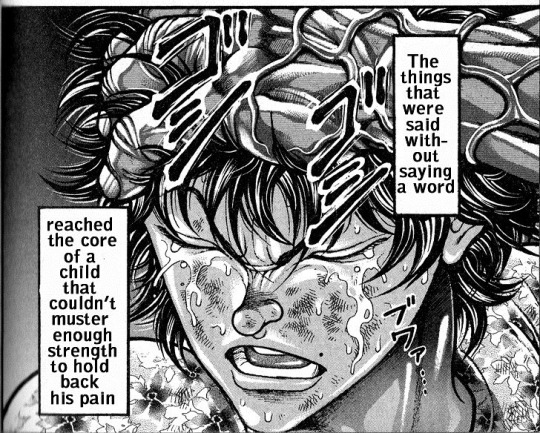
Those are the ideas that help me see the bones of Baki in other works. Men loving men with violence. Men communicating with men through violence. I see these ideas in Jujutsu Kaisen too.
Jujutsu Communication
I’ve gone over how Yuji commucates with other people on their own terms. And a lot of it is through fighting. A conversation without words, learning how someone works. Yuji is good at using fights as tool of communication.

But he’s not the one who tells you that there’s more to the fights than just fighting. Maki does in her spar with the sumo guy.

Just like Baki. Fighting is a means of communication. Gege has told you that there can be more to the fights than fighting. It's a tool used to understand the self and others.

With that in mind, I want to reexamine a particular fight under the lens of Baki rather than Umineko.
Sukuna vs Gojo
Baki tells you that homoerotic readings of its fights are intentional. If you ask me, this probably stems from historical stances on masculinity and homosexuality in ancient Japan. Men loved men and women differently, but both were ok. That’s how Baki can have a girlfriend and his gay fights. Peak bisexual optimization.
What does Jujutsu Kaisen have to do with this? Well it has been extremely queer friendly. We have a multidue of canonical trans characters, non-binary characters, and other flavors of queer characters not disparaged for their identities, Gojo Satoru included. It may not be stated outright, but Gojo and Geto do love each other in a gay way. The subtext is so persisent it’s basically text.
In other words, Gege has already told us, yes please have queer readings of this text. It’s the same way Baki tells you, yes this is straight up convoluded gay sex. So that’s what I’m going to do. I’m going to reread the Sukuna and Gojo fight as some ridiculous mating display between two men who are fighting over can miscommunicate their intent the hardest.
Framed as Courtship
Let’s start with the framing. The pre-fight set up. How does text tell you queer readings are allowed?

Kenjaku does. It’s romantic. It’s a date. This reading has been made valid explicitly. And if there’s room for doubt because of the sarcasm? There’s still additional support for it.
We already know how badly in love Gojo is with Geto. The fight is on the 24th of December, the most romantic day in Japan. And in a fun little Geto parallel, who declared the start of war on this day, violence underlines this new romantic venture.
That doesn’t include Sukuna who recalls Yorozu’s words about teaching love in the context of marriage.

Gojo never heard that conversation which is why the next point is absolutely insane.
The outfit Gojo initially is in resembles that of a groom at a Shinto wedding.

Shinto weddings were implemented after the Heian era. Part of the ceremony includes a priest and a shrine maiden who respectively stand to the right and left of the altar. A purification ritual will occur, lead by the priest, to cleanse the shrine before vows are exchanged. Gakuganji is the priest and Utahime is the shrine maiden. To the right and left of Gojo respectively.

The bride at a Shinto wedding wears mainly white. After the 200% Hollow Purple cleanses the area, the dark shawl is removed and Sukuna remains in mostly white.
How interesting that this battle has been framed as one between groom and bride.
The thing is, marriage in the Heian era was far more lax. There were no major ceremonies. If a man was interested in marrying a woman, he would visit her for 3 nights after receiving approval from her father. Upon the passing of their 3rd night together, the family would have an informal celebration of their union in private. Even after marriage, multiple partners were allowed and sometimes encouraged.
Yorozu’s big celebration proposal to Sukuna and banning of concubines was quite improper by Heian standards. Though it is in line with modern marriages. If Sukuna did not consume any Shinto wedding literature, he probably didn’t recognize that Gojo was dressed as a groom.
But did Gojo dress this way for Sukuna intentionally? The Toji fit served an entirely different purpose. It’s the robes and pre-fight ceremony that catch my attention. So I propose the following:
1) Gojo dressed up as a groom to die and be wed with his one and only Geto in death.
2) Gojo dressed up as a groom in part as an offering to Sukuna. And because Sukuna is from the Heian era it went over his head entirely.
3) Gojo intended for both of these things at the same time and left who he would end up with to fate.
Regardless of what Gojo was going for here, it’s a visual cue combined with the knowledge of it being Dec 24th that encourages the reader to perhaps consider the fight as something other than just a fight. A date perhaps? Kenjaku made the connection and neither Gojo or Sukuna really denied it. Gojo gave the weak excuse of a death anniversary confusion. But much weirder, given how hostile he was to Yorozu, Sukuna did not object to the romantic framing in any capacity.
Am I reaching? Is this reading intentional?
When I start getting this confused by how a translated work wants me to read it, I try to refer to the original language text and anyone who knows it for missing context. Sometimes localizations add things that weren’t there or push readers towards one interpretation. So for the rest of this analysis, I’m going to be focusing on the raws.
I’m going to be honest. My Japanese fudging sucks. I can barely read kanji and can’t reliably translate anything. Feel free to correct me if I got something wrong. That being said, with what little I do know, I have discovered something interesting.
In this post I talked about how weird Sukuna’s manner of speech is. I focused on his you pronoun usage of お前 (Omae) for everyone else and 貴様 (Kisama) for Gojo since this is a strong indicator of how a character views their relationship to someone.

Here's a summary of the two points I made in that post:
1) Omae is informal and either a casual thing amongst peers or indicates the speaker's higher status. Since Sukuna is arrogant, we can reasonably assume he's talking down to people.
2) Kisama historically was a formal show of respect, but in modern times it is a hostile insult, much more rude than Omae. Since Sukuna is 1,000 years old and hates Yuji (who he uses Omae with), we can reasonably assume Sukuna was being friendly to Gojo when he used Kisama.
With that pronoun usage in mind, while examining the raws for the infamous “You Cleared My Skies” speech I found this:

Kisama. Sukuna is very happy and lavishing Gojo with praise. The assumption it was formal from the start seems to be correct. It's hard to read this any other way.
Though Japanese can easily be dubious in its interpretation, there are instances where context can cut off all other readings. I truly believe this one of those cases.
Now, to confirm Sukuna is still only treating Gojo this way I started looking at his you pronouns as he got excited post-Gojo death. Maki is the person he seems to admire the most.

He’s still just using Omae. What does that mean? Gojo is in his own fudging category for Sukuna and he has been there since the start of the manga. (For more on why this is significant, refer to this post.)
Wow ok. That’s pretty intense! We’ve got Gojo dressed up as a groom on December 24th and Sukuna treating Gojo different from anyone else. I read their fight again under the lens of explicit courtship and focused in on these specific panels.

Satisfaction. Now that’s a word that can easily carry a sexual connotation. Love as well. The parallel syntax fascinated me in English. So I decided to look at the raws and see how close they are.

Pretty much the same except for "the one who will teach you love" and "the one satisfying him now". Since the one being satisfied is Gojo by Sukuna, it really seems we can assume the one being taught love is Gojo by Sukuna.
Time to learn some Japanese again!
Kanji has multiple readings. Most have at least two. The Onyomi (Chinese) reading typically used for nouns and the Kunyomi (Japanese) reading typically used for verbs. (This is not always the case but it’s the basics.)
That’s probably why 満 is read as まん (man) when Gojo and Geto are talking about “satisfaction” using the On version and み (mi), the Kun version, when the narrator is talking about who “satisfies” who.

However 満 on its own does not mean satisfaction. It means full. To be filled. Or fullness. 足 (zoku) is added as a modifier after 満 to be read as satisfaction 満足 (manzoku). 足 usually means feet, but it can also mean to be sufficient. Manzoku therefore has a direct translation of being sufficiently full. It’s not a surprise a lot of food places in Japan use Manzoku in their names or advertising.
But what’s this? Why is this sentence written as 満たして or Mi(tashite) instead of 満足して or Manzoku(shite)? The addition of Zoku is what transforms Man into "satisfying". Without the Zoku, it’s just "fill". The means this sentence can be read as “The one filling him up now is—”
We’ve already established that the blank is Sukuna. The new problem is that he’s filling Gojo up. And boy, does that sound homoerotic to put it lightly. But perhaps I am reaching.
So I did what any sane person would do in this situation. I read hentai.
Surely if the phrase 満たして (mitashite) can carry a sexual connotation I will find it in hentai.
...
I immediately found a yaoi doujin called Fill me with your Big Love aka おっきな愛で満たして (Okkina Ai de Mitashite). Honestly, I found too many doujins about creampies specifically. (You have internet access verify this yourself.) When you search Manzokushite the results are much more in line with life satisfaction than sexual satisfaction. ...So Gege decided to use the more frisky phrasing.
Manzoku is also the name of an active sex toy manufacturer (I’m not linking them use a search engine.) and a discontinued adult entertainment news company. So the satisfaction Gojo and Geto talk about, along with Geto using 妬 (ya), the jealous kanji often used between lovers, is definitely probably carrying a sexual connotation too.
So, I’m not reaching. What the fudge did Gege mean by this?
Now that we've established that I am NOT reaching. What do we do with this information?
Well, we ruminate on the fight with the knowledge that Sukuna, of his own volition, decided to get Gojo off, probably.
I have forgiven Nanami for calling Gojo a pervert. If I watched someone bust a nut after being cut in half by his sworn enemy instead of saving the country, I too would be like what the fudge.
Anyways, the typical phrase used for an orgasm in Japanese is 行く(iku). It translates as to go. And yes it can mean to die, as in going to the other side. To die and go to heaven if you will. Which is what Gojo did with a big old smile on his face.
There’s also the term 心天 (tokoroten). It refers to a dish were a semi-opaque white substance is pushed through holes to create noodles. Literal translation using the kanji for heart 心 (kokoro) and the kanji for heaven 天 (ten). (Don’t ask me why them being smack together turns the Koroko into Tokoro. I don’t know.) Which in slang refers to prostate orgasms. This has nothing to do with this analysis I wanted to drop this fun fact in here. …And this image of Sukuna clutching his heart while looking at someone he sent to heaven.

(This is a reach but the idea of this being an elaborate gay pun amuses me greatly.)
I have another fun slang term: 賢者タイム (kenjataimu) which directly translates to sage 賢者 (kenja) time タイム (taimu). This refers to post-nut clarity sending someone into a meditative-like state.
Oh that’s a bit familiar. Sukuna was giving sagely advice to Kashimo and reflecting on satisfaction and love.

And what’s this? Mitashite has made a reappearance! Sukuna is saying “I’ve never thought about needing another person to fill me up.” Which 1. further supports the 'The one satisfying/filling him (Gojo) now is—Sukuna.' reading and 2. suggests Sukuna is a top suggests Sukuna really doesn’t have sexual interest in people. (Since the context of this convo is relationships and love.)
By the way. Acts of eating in Japanese can be modified to carry sexual meanings. It’s a bit more suggestive than English, but it carries over pretty well I think? 肉食系 (nikusokukei) refers to someone who aggresively pursues romantic or sexual relationships. Composed of the kanji 肉 (niku) for meat, 食 (ta) for eating, and 系 (kei) class. If you noticed, 食 isn’t usually read as Soku. It becomes Soku when paired with Niku for some reason. (I don’t know why someone please help me.) Side by side the kanji 肉食 (nikusoku) means meat-eater.
食 is still interesting on it’s own. The 食べる (taberu) reading is normal eating. The 食う(kuu) reading is an innuendo. It can mean to devour someone, like a cannibal, or devour someone sexually.
Sukuna has made it very clear that his eating of people is literal. There’s no innuendo. In fact, if you read into it, he’ll kill you (rip Yorozu and Kashimo).
Gojo, however, appears to be his sole exception to this rule. When Sukuna tells Kashimo not to spoil his pleasure he uses the kanji 興 (kyou). This of course can be directly translated as pleasure, but the Chinese reading of it can also indicate intense excitement or sexual arousal.

Sukuna is pretty good at double-entendre wordplay if his earlier stunts with the kanji for Enchain doubling as Megumi Activities if read a different way is anything to go by. He's a fan of Chinese literature. It's not a stretch to assume there's more going on here.
And if notoriously homophobic Reddit dudebros are posting things like this. Maybe there's a lot more merit to this reading than I can currently grasp.
I’m still pretty convinced Sukuna is aroace. That of course doesn’t bar him from pursuing romantic or sexual relationships. Sometimes there’s the one exception. Sometimes the desire to be with and please an allo partner allows for engagement of activities they aren’t into. Sometimes the actions are pursued without the emotional attachment because they physically feel good. There’s also the gray-scale and demi labels to consider.
With that in mind, I want to emphasize this all points to how important Gojo is to Sukuna regardless of sexuality. He tried to engage with and understand Gojo on terms he won’t for anyone else. And he’s been pursuing this connection relentlessly since the start of manga.
Sukuna’s Negative Rizz
Ok I established that reading the Sukuna vs Gojo fight as unhinged courtship is supported by the text. That doesn’t really say anything about Sukuna sucking at it.
But, my dear reader, that in of itself is proof of his negative rizz. I had to sit down. Learn about Heian era and Shinto wedding rituals, learn more Japanese, splice seemingly unrelated manga panels together, read hentai, and know that Gege is into yaoi to come to this conclusion. I had to rip every little shred of characterization and context apart and rearrange it into something comprehensible.
You know who can’t do that? Gojo.
As far as Gojo is concerned, Sukuna hates him. Kisama is an extremely hostile you pronoun in modern times. And if Gojo can’t tell Shoko (his closest friend after Geto) is stressed over him being used like a meat puppet by her visibly falling back on her addiction, he’s going to default to the assumption Sukuna hates him just as much as everyone else.

And Gojo does just that. He assumes he failed to reach Sukuna. Despite how often they did hand to hand combat and weaponized their knowledge of each other, Gojo believes they never had proper conversation through fighting. He dies not understanding Sukuna, convinced the other was not trying to communicate with him at all.

And if you recall, all of this fight occurred while Sukuna was wearing Megumi’s face. That boy is pretty much Gojo’s adopted child. From my experience, most single parents do not go looking for clones of their kids as partners.
If someone wore the skin of my family member I would assume they were trying to torment me. And torment Gojo Sukuna does. He draws attention to Megumi’s soul being used as collateral and attacks him with the 10 Shadows. We as the audience know this is all for the sake of getting past Infinity using his Shrine. Gojo doesn’t know that. He’s fighting an evil dude who is puppeting the body of his son for god knows what reason.
Seriously, Sukuna sucks at communicating intent.
In Part 3 of my examination of Sukuna’s loneliness, I said Dismantle is a tool Sukuna uses to understand. And that him upgrading it by making Gojo the center of his world was indicative of his desire to reach him. I also said his refusal to use it on Yorozu was him expressing how little interest he had in her.

Yorozu is pissed by this. She sees it as Sukuna rejecting her and I don’t think she’s wrong. Sukuna saved his special Cursed Technique (CT) for Gojo while turning Yorozu down. If we’re considering all the wedding imagery and references that started with Yorozu, I’m certainly allowed to read that as him saving himself for Gojo. (Think of how he lied to Gojo about being the first one he killed.)
There’s also the fact that Yorozu saw their battle as an expression love and lust—that the usage of CT is a type of foreplay under certain circumstances since it is an extension of the self. Combine that with the established premise that fighting is a type of a communication thanks to Maki vs Sumo Guy and you can start to see the courtship logic behind Sukuna’s treatment of Gojo.
If we are to read “The one who will teach you love is…Sukuna” there’s another adorable caveat. Yorozu uses the you pronoun あなた (Anata) for Sukuna.

It’s an informal you pronoun used by people learning Japanese. Native speakers try to avoid using it as it can come across as rude. But in the context of love? This is colloquially called the wife pronoun as its often used by a wife to her husband.
If you wanted to localize its usage in the way Yorozu means it, Anata might become “you, dear”. So here we have Sukuna dressed in white, like a bride to Gojo’s groom, thinking of him as Anata.
The problem is, Gojo doesn’t know that. Sukuna never bothered to open his mouth and say this was an act of love. Sure he told Kashimo in the most roundabout way possible, but Gojo was the one who needed to hear that. If a courtship is going to be this diabolically complicated, there has to be clear hints for the other party. JJK is not Umineko where there’s a witch that can revive the dead over and over until the idiot finally understands this was all for them.
Gojo also doesn’t have access to the kanji Sukuna uses to describe certain techinques or words. He hears the phonetics and runs with whatever best fits the context. This means there’s no way for him to catch the double-meaning unless he’s a certain type of lingust, which he is not. His manner of speech and personal interests don’t line up with the flowery language of the Heian Era. The types of written works Gojo is into are historical war politics from the Sengoku period (known for violence more than the fine arts), Shonen manga, and physics/math.
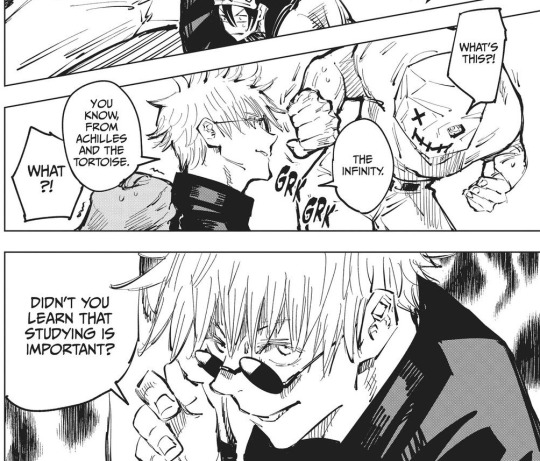
And what's this? According to CFYOW (the canon light novels): JJK Thorny Road at Dawn, Chapter 3 Asakusabashi Elegy, Gojo doesn't even like ancient poetry. You know, the thing Sukuna enjoys and tries to communicate with.
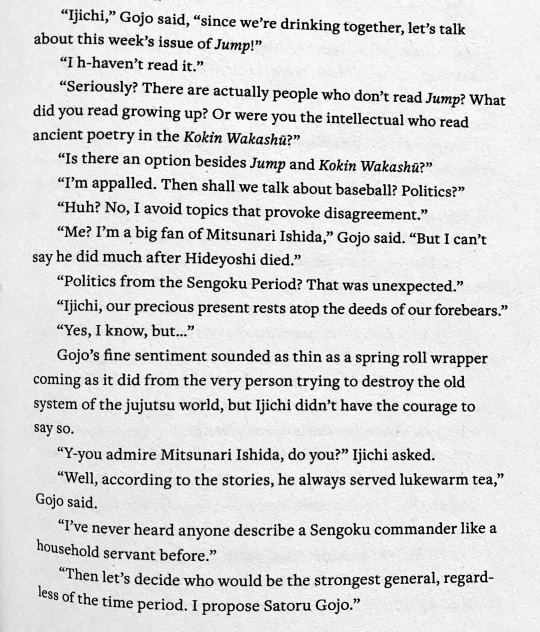
The Kokin Wakashu Gojo off-handedly disparages is a compilation of Hiean Era poetry known as Waka. This was the primary means of communication amongst the noble class and spiritual leaders at the time. And the thing is, this poetry is supposed to be read into. Down to the quality of stroke and paper, not just the kanji written. Especially for courtship.
It’s not that Gojo is stupid. He just doesn’t specialize in the studies that would give him a more critical ear to Sukuna's words. And Sukuna doesn’t seem to understand that no one in the modern era communicates like this anymore.
If you didn’t know, this is why Japanese characters introduce themselves they often describe what kanji their name is spelled with. Take for example: Satoru. He uses the kanji 悟 meaning enlightenment. This kanji can be read as Go instead of Satoru. Additionally, the name Satoru can be written in kanji as 聡 for smart, 智 for wisdom, 知 for knowledge, 了 for understanding, 哲 for philosophy, 聖 for virtuous, or 暁 for daybreak. That’s 8 different kanji possible if you hear the name Satoru.
This is why Sukuna’s wordplay for everything else can be easily missed by other characters. They hear the words and cannot read the kanji like us. Context decides what Sukuna means for them. And since Sukuna’s context for most is violence and insults, it’s very hard for them to think about his words in any other way.
And boy howdy does Gojo miss it. Sukuna straight up calls him his husband and it took me several rereads to catch it. While mocking Gojo for being unable to open his domain, Sukuna calls him "painfully ordinary". This is localized from the word 凡夫 (bonpu) which can also be translated as unenlightened. (A layered insult! Sukuna is pretty much saying Gojo's sorcery is so boring he shouldn't even call himself the Honored One.)
The thing is...Bonpu is comprised of the 2 kanji 凡 for mediocre, and 夫 for husband. (Please note that there are many other ways to call Gojo a ditz without using the kanji for husband.) And an update from the Replies: Turns out there's layers to the gayness too.

It's come full fudging circle. Gojo came dressed as a groom for a wedding and Sukuna thinks they're already married. The miscommunication is off the rails.
But wait! There's more...
Earlier I mentioned that the kanji for Enchain doubles as Megumi Activities. Let's break that down more. (Unfortunately the Twitter account of the person I referenced may or may not be nuked so here's this screenshot I've doctored.)

So we have the translation of Enchain from 契闊 (Keikatsu), which might be better localized as Separation.
This term comes from a Chinese poem about lovers who are husband and wife in The Book of Odes, Section I (Lessons from the States), Chapter 3 (The Odes of Bei), Poem 31 (Banging the Drum). (Here's a link to the full poem and context of it.)
In summary, it’s about a soldier who is on the brink of death, having lost nearly everything after being abandoned by those in power, lamenting the happiest days of his life with his love are ones he can never get back. (Hey that sounds just like what Sukuna did to Yuji!)
Keikatsu specifically comes from this passage:
“Our vow is beyond death and life”, I and you are together I always remembered. I will hold your hand, And together we grow old.
Too pitiful we are faraway apart, The distance separates us to meet again! Too miserable this takes forever, And it does not let us fulfill our vow!
Keikatsu is used to exemplify how the physical distance between the husband and wife prevents them from fulfilling their wedding vows. And that's just what Keikatsu/Enchain does to Yuji and Megumi, it causes painful separation neither of them wanted.
Keikatsu also tells Yuji exactly how Sukuna plans to do it. 契(kei)闊(katsu) can be written as 恵(kei)活(katsu). The kanji 恵 can be read as Kei or...Megumi. (It's the literal kanji used for his name.) The kanji 活 (katsu) can mean "activities", which is how we get Enchain=Megumi Activities.
A two for one special! Sukuna mocks Yuji for being so close with Megumi while telling him exactly how he's going to destroy their relationship.
It seems this has nothing to do with Gojo until you consider the 3rd possible reading from wordplay with 契闊 (Keikatsu). The kanji 契 when read as Kei refers to a promise, pledge or vow. When 契 read as Chigi? It can refer to sexual intercourse, especially between husband and wife.
So we have 契闊(keikatsu, separation), 恵(kei Megumi)活(katsu, activities), and 契(kei chigi, spousal sex)活(katsu, activities). It's no wonder he erased Yuji's memory of it.
Keep in mind, that when Sukuna uses Keikatsu, the only vow that he has made at this point is his promise to kill Gojo. He eventually does that using Megumi's body during a fight framed between groom and bride. And for reasons beyond their control, Sukuna and Gojo have been unable to fulfill that vow through lengthy separation.
Notes from poem "Banging the Drum" Sukuna references include the following:
"And during the operation, he lost his horse, which was a desperate situation (horses in ancient time carried soldier supply and weapons, are life companion for soldiers in advance or retreat), he lost his horse, his supply, maybe his armor and weapons, and the road he was facing that we may lose his life so he may never go back. In all these mess, he started searching, and somehow at this hopeless moment he started to revisit his happiest moment, when he together vowed in marriage ceremony with his wife, and he was even afraid that he might never see his love again."
"And His last statement for his true value is his home, his love, his fulfillment of his vow is his true duty. Hero's duty is to pursue love."
In Buddhism, which JJK is heavily influenced by, horses are a pretty big deal. Horses can represent the path to enlightenment, especially since The Buddha's horse is what takes him on this journey away from his wife and children. They separate in the end though, the horse dying of a broken heart.
Remember how Sukuna called Gojo unenlightened? He sort of guided Gojo to enlightenment using Mahoraga, whose Eight-Handed title is a reference to the Eightfold Path to be followed for enlightenment. Buddhist enlightenment is centered around liberation from suffering. (Just check the wiki entry to verify this.) Infinity was the source of Gojo's suffering and Sukuna cut right through it.
Sukuna has been running around with a broken heart for a good chunk of the post-Gojo fight. And if you take that into consideration with this poem and all the other symbolism, he's somehow a Buddha, a Bodhisattva, the dying husband, the widowed wife, and the heartbroken horse all at the same time. Not unlike his wordplay taking on every possible meaning at once.
But my point here is that Sukuna might’ve seen his fight with Gojo as consummation of their marriage. (There's probably a joke in here about the husband reaching climax while leaving his wife unsatisfied.) Remember in the wise words of Itagaki Keisuke, "Fighting and sex are exactly the same!"
In Conclusion?
This is possibly one of the most bizarre and elaborate expressions of love I have lost my mind over. Sukuna gave everything Gojo ever wanted from Jujutsu violently. He did it in such an unpleasant and cruel way that the target of his affection thought there was nothing between them. Sukuna also hid his intent under social norms that no longer exist. Unless Gojo happened to be into ancient literature, there was never a scenario where he would catch onto this. Sukuna's failure is critical on multiple levels.
It’s impressive. It really is. No one knows how Sukuna’s strange little brain works so he’s stuck being loner without anyone that fully understands him. (I’m still thinking about how Uraume didn’t know Sukuna was a twin for over 1,000 years.) He’d have to let people in and tell him outright, but he’s just like Gojo so I guess that’s never happening.
#cactus yaps#I need to have my weeaboo license revoked.#How on earth did I miss this?#GEGE WHAT DID YOU MEAN BY THIS.#Hi yes I will dress as a traditional groom on Dec 24th the most romantic day in Japan after someone else called the arrangement a date.#Is this even subtext at this point?#Why can’t these men use their got danged words instead of Umineko levels of psychological warfare.#Sukuna: ''Gojo is clearly driven by lust. How do I have s*x with him without actually having s*x?#Fighting and death are basically the same thing as s*x so I’ll do that and hopefully he sees that I love him.''#Gojo to Geto: ''Sukuna gave me the best *rgasm I've had in years. I think he hates me.''#Geto: ''Huh.''#Absolutely fascinated by girlfailures Sukuna and Geto horribly fumbling Gojo in completely different ways.#I want them to fight over him in the most passive aggressive way possible.#Gojo was meant to be a romcom harem protagonist.#Though Sukuna should be way more ok with poly given Heian rules on relationships.#But you know Geto was also ok that someone else was able to make Gojo feel good.#I like that prioritization of his pleasure. Even if it came a little too late.#Much to think about.#Consider this my Sukugo manifesto part 2.#Update 8/14/24: One of these days I'm just going to have to make a new post.#Update Cont: Sukuna calling Gojo his mid unenlightened husband wife spouse all at once using two kanji is truly insane.#Update 8/19/2024: All according to Keikatsu.#sukugo#ryomen sukuna#gojo satoru#jjk spoilers#jujutsu kaisen#lemons
236 notes
·
View notes
Text
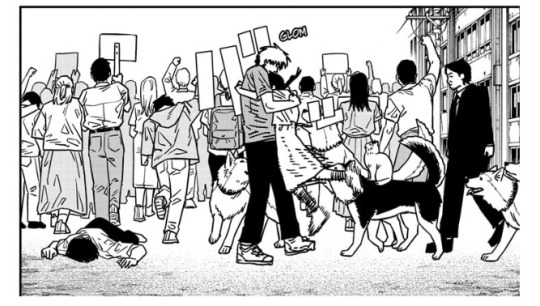
Contradicting to popular belief, Dennis is a very selfless person. Although when you first start the series, where he is depicted to be a very shallow person, only joining because he likes Makima and wants girls to fall for him (or some sort it's been a while since I've read the front).
As you read on you will realise the compassion he has. Despite being not even close to human since the start, and having to deal with the burden of killing his father, the death of his mother and living in the slumps, only longing for a normal life, he is one of the kindest people in the story (perhaps because he doesn't have a human heart anyways).
For example, he has kept Makima's dogs even though they are part of a past I would believe he doesn't want to remember. He kept them for Nayuta's sake AND for the dogs because he considers them a part of Nayuta's past + if he left the dogs behind they might go to someone abusive. From this example, we can see that he is kind because even though he could abandon the dogs (and meowy but he wouldn't do that because it serves as a memory of power whom he misses very much) which would help with his financial position, he didn't.
Example two, Nayuta. In the aquarium date chapter, Asa asks why Denji is so obsessed with selling things and making money. He answers that he wants to save money so that Nayuta can go to college because he believes that she has the potential and he wants her to have a normal life which he did not have. This shows he truly does care about Nayuta and that he brought her up well. The way that Nayuta acts is a product of it. Denji has created a space for her where she can express her emotions freely and grow up as a free being (maybe I'll do an analysis of her eventually and also he learnt all this from aki definitely I'm gonna cry)
In the recent chapter (chapter 133), it is shown that Denji chose to not transform into Chainsawman even though it is something he loves to do, something that brought him happiness because he is worried about Nayuta's life he wouldn't know what to do if he lost another person. He was willing to do degrading things (ie: yoshida scene btw i hate him now he was pretty at the start but now he's so annoying) for her and I really really admire that from him.
As said by Dennis himself, he does not fight for anyone, he has died again and again but he's never stopped and he was named my the people themselves in time of need. I think he is heartbroken they would take out a fake Chainsawman who stands for things he doesn't stand for, (because, again, denji doesn't have a human heart and I don't believe he has morals...) and I think he deserves better :)
Authours note: DENNISSS I LOVE YOUUUUU
#chainsaw man#nayuta#csm#chainsaw man spoilers#csm manga#chainsaw man 133#chainsaw man thoughts#dennis#denji chainsaw man#denji#denji hayakawa#csm theory#chainsaw man theory#chainsaw man denji#asa mitaka#theory
58 notes
·
View notes